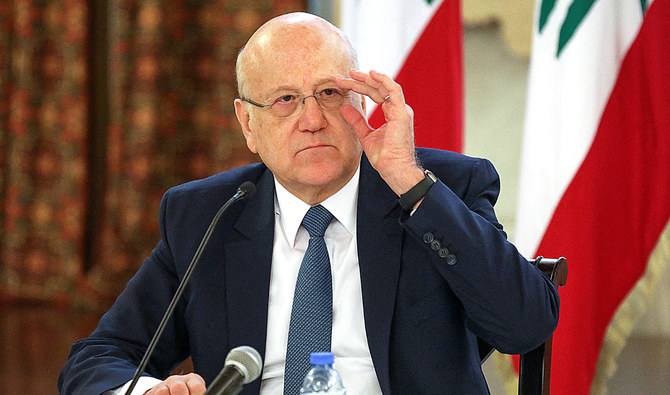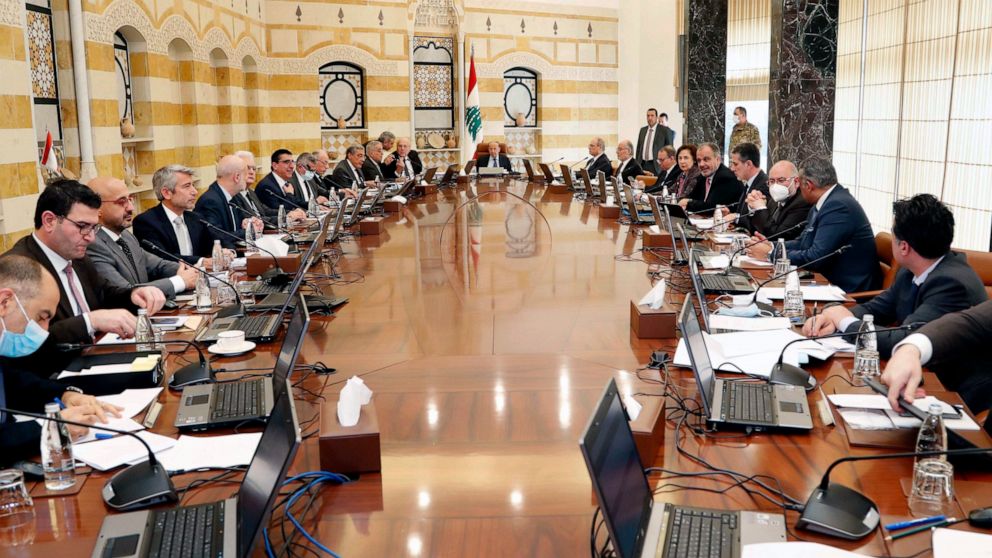
سجعان قزي
@AzziSejean
فيما كانت الدولةُ اللبنانيّةُ غارقةً في السجالاتِ العقيمةِ وقابعةً في عُزلتِها، وُلدَ، على رَمْيةِ صاروخٍ من لبنان، "حِلفٌ أطلسيٌّ" جديدٌ في الشرقِ الأوسط ضَمَّ ـــ كأعضاءٍ مؤسِّسين ـــ المغربَ ومِصرَ والبحرين والإماراتِ العربيّةَ وإسرائيلَ وأميركا (28 آذار). وإذ اعْتذرَ عبدالله الثاني، ملكُ الأردن، عن حضورِ اللقاء الأوّل، زارَ الضِفّةَ الغربيّةَ في اليوم ذاتِه والتقى رئيسَ السلطةِ الفِلسطينيّةِ، ثم استقبل في عمان إسحق هرتزوغ رئيسَ دولةِ إسرائيل (30 آذار). وفيما "الحلفُ الأطلسيُّ" الجديدُ ركّزَ على الخطرِ النوويِّ الإيرانيّ، ركّزَ لقاءا رامَ الله وعَمّان على القضيّةِ الفِلسطينيّةِ وحلِّ الدولتين. لكن ما جِدّيةُ استهوالِ الخطرِ الإيرانيِّ فيما أميركا متلهِّفةٌ إلى توقيعِ الاتفاقِ النوويِّ في فيينا؟ وما مفعولُ التركيزِ على حلِّ الدولتين طالما أنَّ التطبيعَ العربيَّ مع إسرائيل حَصَل قبلَ ولادةِ الدولتين؟ صارت إسرائيلُ كَنّةَ العروبةِ، والعربُ قُرّةَ عينِ إسرائيل، وبقيَت فِلسطينُ أرملةَ الجميع.

BEIRUT, (Reuters) - Lebanon's Cabinet on Wednesday approved a long-delayed draft capital control law that still requires final approval from parliament amid a worsening financial crisis now in its third year, Information Minister Ziad Makari said in televised remarks following the session. Formal capital controls are a policy recommendation of the International Monetary Fund, from which Lebanon hopes to secure an aid package after the country's financial system imploded in 2019, paralysing the banking system and freezing depositors out of U.S. dollar accounts. Lebanon's parliament had been set to discuss the bill at a Tuesday session but members of parliament asked that the government first officially endorse the law, noting it had been referred to them by an unspecified ministerial committee.
Deputy Prime Minister Saade Chami said after the session that the law was approved with minor amendments related to a committee that determines terms and conditions for withdrawals in pounds and foreign currency. He said the committee would now include two economic experts and a high-ranking judge as well as representatives of the central bank and finance ministry. MP Ali Hasan Khalil, a top aide to House Speaker Nabih Berri, said on Monday that Berri was ready to schedule another session to adopt the bill before parliamentary elections on May 15. No such session has yet been scheduled.

By NAJIA HOUSSARI -- arabnews.com -- BEIRUT: Lebanon’s wheat crisis is being exacerbated by bureaucracy, as the price of the grain continues to soar, according to a senior official. More than two weeks ago, the Cabinet granted the General Directorate of Grains and Sugar Beets an advance of 36 billion Lebanese pounds ($1.6 million) to buy 50,000 tons of wheat, which would have been sufficient to meet the country’s needs for a month. But the advance was never received as a decree was not issued. “Since no decree was issued to allow the directorate to ask the central bank to convert the 36 billion Lebanese pounds into dollars, the minister of economy resorted to requesting exceptional approval from the Cabinet, which convened on Wednesday to obtain an additional amount,” Georges Berbari, the general director of grains and sugar beets, said. “The administrative measures for the process of buying wheat take a long time. Meanwhile, international prices are rising. The amount allocated two weeks ago is no longer sufficient to purchase 50,000 tons of wheat,” he said. “The situation is very stressful amid the decreasing wheat stocks. The important thing is to get any amount quickly, even if it will only secure 30,000 or 40,000 tons of wheat.”
Ahmad Hoteit, the president of the Association of Mills in Lebanon, said: “The Ukrainian crisis has begun to have repercussions on Lebanon. Wheat shipments may arrive next week at higher prices, and given the high demand, the country that pays more gets the wheat. We asked Prime Minister Najib Mikati and the central bank not to delay securing the credits.” Lebanon consumes about 600,000 tons of wheat a year, of which 80 percent is imported from countries like Ukraine and Russia. But it is facing a severe financial crisis, prompting the state to gradually lift subsidies on dozens of vital materials, including fuel, medicine and flour. Despite the problems, Agriculture Minister Abbas Hajj Hassan dismisses claims the country is facing a wheat crisis. “The minister of economy has communicated with the U.S., Canada, Australia, India and other markets to import wheat from them,” he said. “We are waiting for the central bank to open credits, and the ministry’s agricultural research department has warehouses ready for storage.”
by Payton Bruni – AlBawaba.com — The UN Educational, Scientific and Cultural Organization (UNESCO) announced on March 28 that it has completed …
Khazen History


Historical Feature:
Churches and Monasteries of the Khazen family

St. Anthony of Padua Church in Ballouneh
Mar Abda Church in Bakaatit Kanaan
Saint Michael Church in Bkaatouta
Saint Therese Church in Qolayaat
Saint Simeon Stylites (مار سمعان العامودي) Church In Ajaltoun
Virgin Mary Church (سيدة المعونات) in Sheilé
Assumption of Mary Church in Ballouneh
1 - The sword of the Maronite Prince
2 - LES KHAZEN CONSULS DE FRANCE
3 - LES MARONITES & LES KHAZEN
4 - LES MAAN & LES KHAZEN
5 - ORIGINE DE LA FAMILLE
Population Movements to Keserwan - The Khazens and The Maans
ما جاء عن الثورة في المقاطعة الكسروانية
ثورة أهالي كسروان على المشايخ الخوازنة وأسبابها
Origins of the "Prince of Maronite" Title
Growing diversity: the Khazin sheiks and the clergy in the first decades of the 18th century
Historical Members:
Barbar Beik El Khazen [English]
Patriach Toubia Kaiss El Khazen(Biography & Life Part1 Part2) (Arabic)
Patriach Youssef Dargham El Khazen (Cont'd)
Cheikh Bishara Jafal El Khazen
Patriarch Youssef Raji El Khazen
The Martyrs Cheikh Philippe & Cheikh Farid El Khazen
Cheikh Nawfal El Khazen (Consul De France)
Cheikh Hossun El Khazen (Consul De France)
Cheikh Abou-Nawfal El Khazen (Consul De France)
Cheikh Francis Abee Nader & his son Yousef
Cheikh Abou-Kanso El Khazen (Consul De France)
Cheikh Abou Nader El Khazen
Cheikh Chafic El Khazen
Cheikh Keserwan El Khazen
Cheikh Serhal El Khazen [English]
Cheikh Rafiq El Khazen [English]
Cheikh Hanna El Khazen
Cheikha Arzi El Khazen
Marie El Khazen